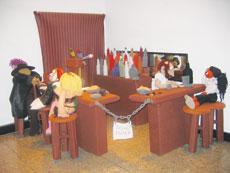Dateline: Downtown
May 9, 2006
I was riding home on the train the other day when two people start arguing, an older man and a young woman. They were talking politics. Predictably, the man was of a rightish bent, the young lady somewhat liberal. Equally predictably, neither of them knew what they were talking about, regarding anything. I’ll spare details, but it was desperate. Eventually, inevitably, they began arguing, and they were each singularly and spectacularly wrongheaded in their own special ways. It became quite a scene. I decided that I couldn’t let the incident slip without gaining something fruitful from the experience, and so I put a longstanding suspicion of mine to the test, to pass or fail according to its own merit or lack thereof. Here are the results.
STEP 1: HYPOTHESIS
I have a theory; the more willing you are to talk politics in public, the less you’re likely to have sensible ideas or to be able to express them considerately and politely. This effect grows exponentially with the volume in which you express yourself. I call this Roche’s Theory of Thermogenic Oxygen. I decided to test this theory.
STEP 2: TEST
At first, the two chatted fairly amicably. The man, though, was overbearing in that way older men who really haven’t lived much, but think they have, have. The woman couldn’t express a lucid thought, but was convinced of the infallibility of her opinion. Disaster loomed. Where it would come I did not know, but when I looked out the window and saw the animals fleeing I knew I was in trouble. I hunkered down and started taking notes. You know, for posterity.
The man hinted at vast sums of worldly knowledge that he was privy to. This “real world” “experience” evidently afforded him an absolutely correct measure of all matters great and small, from why they will never catch Whitey Bulger to why we had to catch Saddam. Whenever the woman said anything, agreeing with him or not, he smirked. I noted several factual errors in his assertions; for instance, he said that global terrorist incidents had decreased since the onset of the war in Iraq. He stated this loudly. The US State Department disagrees with him. So far my theory was valid.
STEP 3: REFINE HYPOTHESIS
As of yet, there had been no vocal disagreement between the two. He would bluster and she would hedge, and while neither of them were wandering too far into the wingnut wilderness, they weren’t shining examples of the well-informed, vigilant populace our Founding Fathers dreamed of in between drinking binges and slave auctions. My interest was flagging, and I considered abandoning my experiment. Step four, however, would prove to be most fruitful for my study.
STEP 4: RETEST
Evidently, the war in Iraq wasn’t compelling enough. The woman seemed much more willing to discuss it than the man, though the man spoke more. Whenever she would try to say something he’d raise his hand and say “Ah, you’re not letting me finish” and start in on some jibber-jabber, even if he hadn’t been saying anything. They were treading water, though, and not really arguing.
“What do you think about the immigration protest they’re having today?”, she asked him. Ah ha. Water out, fire in.
“I think they’re a blight on society, I think they come over here to live under-the-table, tax-free, off of our hard work so they can send money home to Panama”. He thought for a second before adding, “can’t say as I blame them!” magnanimously. Had I informed him that three out of four undocumented immigrants do, in fact, pay payroll taxes would have been interfered with my experiment. I let it progress.
“But this is America. It’s a country of immigrants,” she stated. He began to make sense by saying that yes, America was a country of immigrants, but past immigrants came legally through Ellis Island and learned the language. Today’s immigrants are largely itinerant laborers from one ethnic group who are as likely to head back home when they’re unable to work. A little crude, perhaps, but not insensible. She saw no wiggle room though, and immediately accused him of racism. She began to lecture him.
He refused to be lectured, and instead counter-lectured. The dueling lectures grew louder and louder across the aisle. The conductor came over and told them to quiet down or he would throw them off of the train. The man stopped.
“Winston Churchill said something a long time ago,” he started again. I immediately, involuntarily winced. I knew where he was going. It was a rush hour train though, and crowded; all avenues of escape were blocked. “If you’re not a liberal by the time you’re twenty, you have no heart. If you’re not a conservative by the time you’re forty, you have no brain.”
He sat back in self-satisfaction, smirking again, before continuing; “Now listen, I grew up in the ’60s, I did the hippie thing…” Before you dried up, sold out, and vacuumed the flower-power bullshit out of your head so you could vote for that satanic vampire Reagan, you heartless bastard? I thought, scientifically. He began speaking again of Experience, and how you’re just not going to understand things until you reach a certain age. I wished him immortality, sensing he would need it.
STEP 5: CONCLUSION
I’m ready to drop the “theory” part and declare my observation law. Listen, folks, everybody has their opinions, some more solid than others. But please, please, if you can’t keep them to yourselves- which you shouldn’t, nor should you have to- understand that you’re unlikely to ever change anyone’s mind over anything, NO MATTER HOW LOUDLY YOU YELL. The only thing worse than someone who thinks he has all the answers (or any answers) is someone who thinks that turning up the volume always makes the song sound better. After a while, the treble drowns it out.


























































